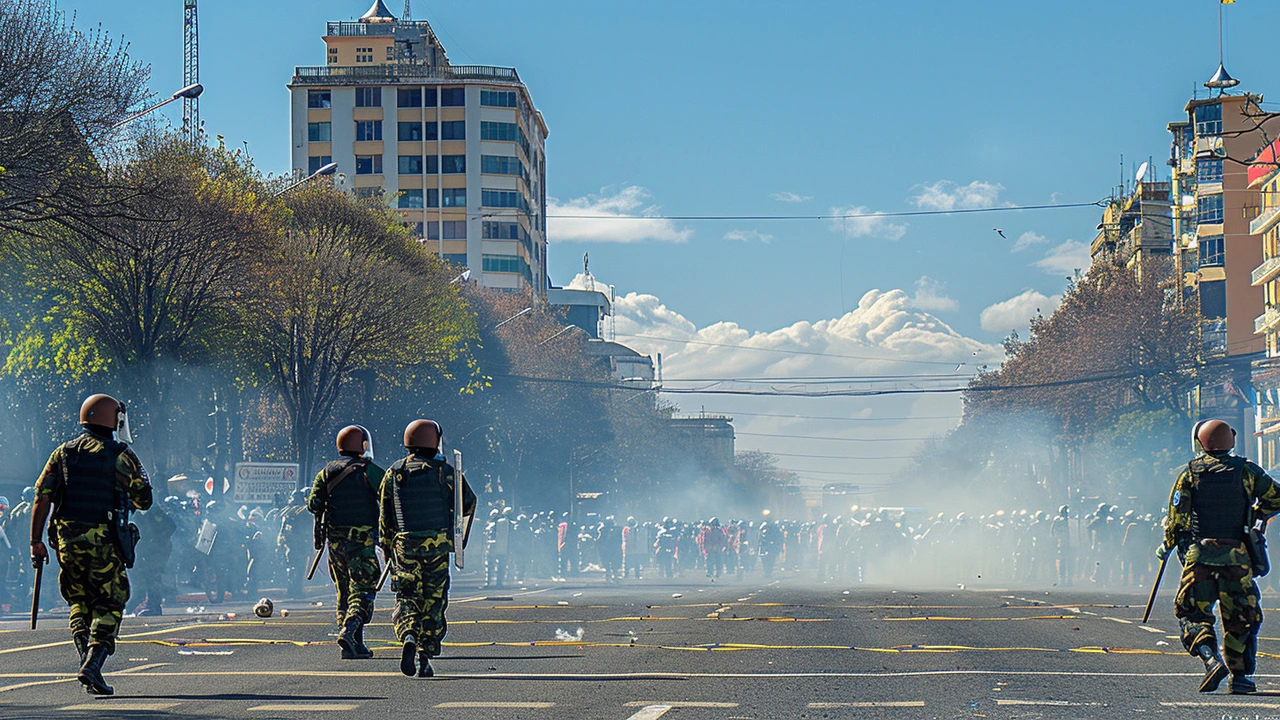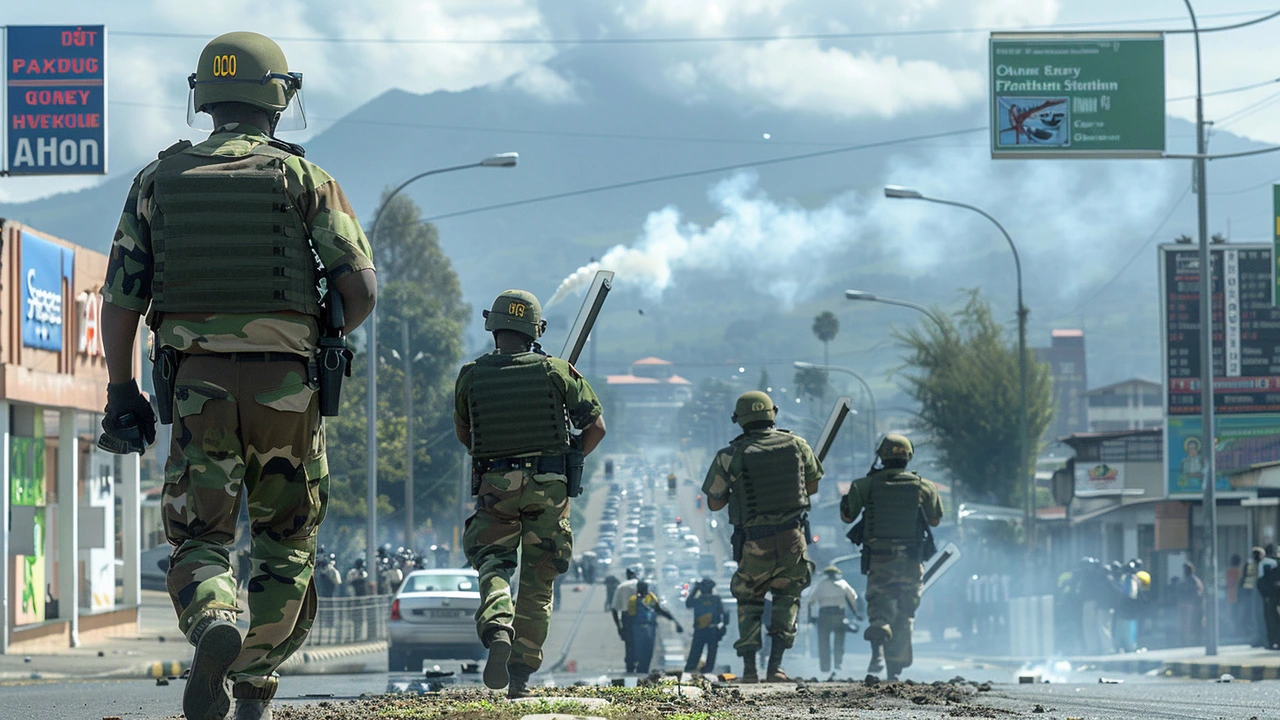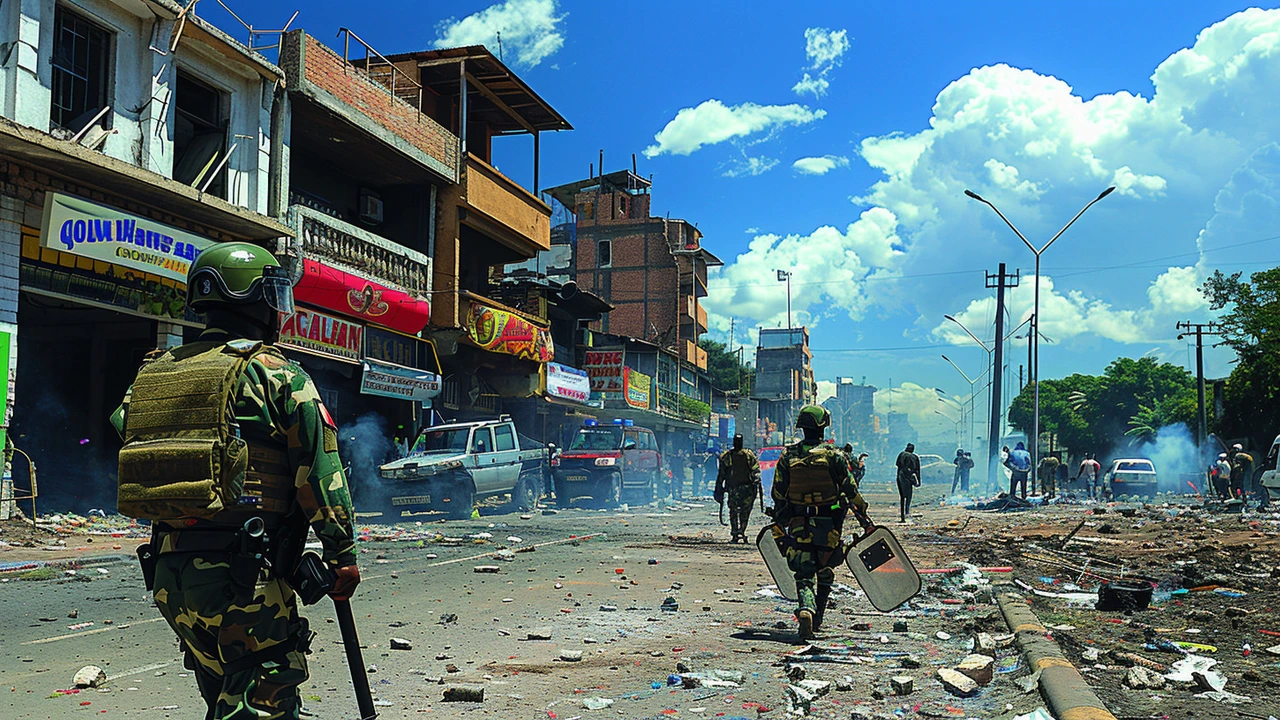Background of the Protests
The political climate in Kenya has been simmering with discontent over the proposed Finance Bill, leading to widespread demonstrations across the nation. The Orange Democratic Movement (ODM), spearheading the opposition, has been vocal in its opposition to the bill, which they argue will exacerbate the economic burdens on ordinary Kenyans. On Thursday, tensions reached a boiling point during protests along Moi Avenue, where a tragic incident unfolded.
The Incident
The tragic death of Rex Kanyike Masai, a 29-year-old demonstrator, has sparked outrage and calls for justice. Witnesses recount chaotic scenes as a police officer, allegedly in plainclothes, fired into the crowd of retreating protestors. Masai was struck in the leg and, despite immediate efforts to save him at Bliss Hospital on Moi Avenue, he succumbed to his injuries.
This incident, captured on unverified amateur footage, shows the moment when the officer opened fire. The footage has circulated widely, adding to the public outcry and calls for accountability. The ODM has been at the forefront of those demands, insisting that the officer responsible must be held accountable for his actions.

ODM’s Demands
In a press statement, prominent ODM lawmakers, including Minority Leader Opiyo Wandayi and Minority Whip Junet Mohammed, condemned the actions of the police and reiterated their commitment to protecting the interests of Kenyans. Wandayi emphasized that despite the opposition's failure to halt the Finance Bill, the struggle to safeguard the rights and interests of Kenyans is far from over.
Junet Mohammed took a sterner tone, criticizing members of the ruling coalition for disregarding valid opposition input and voting under the influence of the Executive. He insisted that such incidents of police violence should not go unpunished and called for immediate and thorough investigations.
Public Reaction and Government Response
The incident has ignited a wave of reactions from the public and various civil rights organizations. Social media platforms have been inundated with calls for justice, with many users sharing the footage of the incident and voicing their outrage.
The Independent Policing Oversight Authority (IPOA) has also taken note. In a statement, IPOA Chairperson Anne Makori confirmed that an investigation into the fatal shooting of Rex Kanyike Masai is underway. She revealed that the Authority has already established contact with Masai’s family and is also looking into other incidents of serious injuries sustained during the protests.
The intensity of the protests and subsequent clashes with law enforcement has led to numerous injuries. Reports indicate that at least 200 people, including several police officers, were injured during the demonstrations across 19 counties. The sustained unrest and aggressive response from the police highlight the deep-seated tensions between the public and the authorities.

The Wider Implications
This incident is emblematic of the broader issues facing Kenya. The proposed Finance Bill, which catalyzed these protests, is seen by many as a policy that will disproportionately affect the working class. The opposition's struggle against it symbolizes a larger fight against economic policies perceived as unjust.
The shooting of Masai has cast a spotlight on the actions of law enforcement during civil demonstrations. It raises questions about the use of force and the accountability of those in positions of power. Cases of police brutality are not new in Kenya, but each incident adds pressure on the government to enact reforms and prevent further loss of life.
Moving Forward
As the protests continue, the ODM and its supporters remain resolute in their mission to challenge the Finance Bill. The death of Rex Kanyike Masai has imbued the movement with a renewed sense of urgency and injustice. The incident serves as a grim reminder of the stakes involved in the ongoing political struggle.
Lawmakers and civil society groups are now watching closely as the IPOA conducts its investigation. For many, the outcome will be a litmus test for the government's commitment to justice and reform. The onus is on authorities to ensure that justice is served, both for Masai and for the countless others who have suffered in the fight for a fairer Kenya.
In conclusion, the tragic death of Rex Kanyike Masai during the anti-Finance Bill protests has not only galvanized the opposition but also highlighted systemic issues within Kenya’s law enforcement. This moment in Kenya’s political landscape is pivotal, with ramifications that extend far beyond the immediate crisis. As the nation grapples with these challenges, the demand for accountability and justice remains louder than ever.


Ron Rementilla
June 21, 2024 AT 19:52Seeing the police officer fire into a retreating crowd shows a dangerous lapse in protocol. The ODM’s call for an arrest is not just political posturing; it’s a demand for rule of law. Accountability must extend beyond the immediate incident to the policies that enable such force. Kenya’s democratic institutions need to prove they can protect citizens.
Chand Shahzad
June 27, 2024 AT 09:12From a formal standpoint, the incident underscores a breach of constitutional guarantees. The ODM’s insistence on an arrest aligns with international human‑rights standards. It is essential that the Independent Policing Oversight Authority conducts a thorough, transparent inquiry. Moreover, the Finance Bill’s socioeconomic impact amplifies public unrest. Therefore, the government must act decisively to restore confidence.
Eduardo Torres
July 2, 2024 AT 22:32It’s tragic when a protest turns deadly. The community deserves answers.
Emanuel Hantig
July 8, 2024 AT 11:52We must ask ourselves what kind of society condones lethal force against peaceful demonstrators. The philosophical underpinning of a free nation rests on protecting dissent. If the state fails at that, legitimacy erodes. Let’s hope the investigation uncovers the truth.
Byron Marcos Gonzalez
July 14, 2024 AT 01:12Ah, the melodrama of power-an officer in plain clothes turning the street into a theater of blood. The spectacle is as old as governance itself, yet each act feels freshly grotesque. We watch, we gasp, we tweet, and the curtain never truly falls. Such theatrics demand a sober audience.
Chris Snyder
July 19, 2024 AT 14:32For anyone needing a quick rundown: the officer allegedly fired without provocation, resulting in a fatality. The ODM’s demand for arrest is consistent with past calls for police accountability. The IPOA has opened an investigation, which should include forensic analysis and witness statements. Keep an eye on official releases; they’ll shape the next steps. 😊
Hugh Fitzpatrick
July 25, 2024 AT 03:52Sure, let’s wait for the next press conference while the family mourns. Nothing says ‘justice’ like a delayed apology.
george hernandez
July 30, 2024 AT 17:12The death of Rex Kanyike Masai is a stark reminder of the perils of unchecked state power. When police open fire on unarmed civilians, the social contract is instantly fractured. Kenya’s history is littered with similar tragedies that have ignited waves of protest. The Finance Bill itself threatens the most vulnerable, and the violent response only deepens resentment. Communities across the counties are now demanding more than statements; they want concrete accountability. Independent investigations, like those promised by the IPOA, must be transparent and swift. Legal reforms should limit the circumstances under which lethal force is permissible. Civil society organizations play a crucial role in documenting abuses and pressuring officials. International observers have already flagged the incident as a potential human‑rights violation. The media’s role in broadcasting the footage cannot be understated; it galvanizes public opinion. Yet, without systemic change, the cycle of protest and repression is likely to repeat. Young Kenyans, who are the backbone of the protests, must be heard in legislative corridors. Economic policies that ignore grassroots realities will only fuel further dissent. The government’s response in the coming weeks will be a litmus test for its commitment to democratic norms. Ultimately, justice for Masai will be measured by how the state reforms its policing standards.
bob wang
August 5, 2024 AT 06:32Indeed, the situation calls for immediate legal scrutiny, thorough forensic analysis, and transparent communication; the public deserves no less. Moreover, the Finance Bill's potential impact on everyday Kenyans cannot be ignored-its provisions risk deepening economic stratification, which only fuels further unrest. 🧐📜
Seyi Aina
August 10, 2024 AT 19:52Man, they always talk tough until a kid gets shot. Then it’s all “we’re looking into it”.
Alyson Gray
August 16, 2024 AT 09:12I feel the pain of the Masai famliy-so real, so raw. It’s like watching a heart break on live TV, and you can’t look away. The govt needs to step up, no more empty promises. This ain’t just politics, it’s lives.
Shaun Collins
August 21, 2024 AT 22:32Another day, another tragedy we pretend isn’t happening.
Chris Ward
August 27, 2024 AT 11:52Well, if the police are so scared, why not just stop shooting?
Heather Stoelting
September 2, 2024 AT 01:12We can do this! Keep the pressure on, stay united!
Travis Cossairt
September 7, 2024 AT 14:32Unity’s great but action’s what matters.
Amanda Friar
September 13, 2024 AT 03:52Oh sure, let’s wait for the next “official statement” while justice gathers dust.
Sivaprasad Rajana
September 18, 2024 AT 17:12It is important that the investigation be clear and fair. The family deserves answers.
Andrew Wilchak
September 24, 2024 AT 06:32Check the police logs, they’ll have the truth. Short and simple.
Roland Baber
September 29, 2024 AT 19:52Reflecting on this tragedy, we see a broader pattern of state‑society tension. Philosophy teaches us that power unchecked breeds fear, and fear dismantles trust. The path forward requires not only legal reform but also a cultural shift within law enforcement. Only then can Kenya heal and move toward a more equitable future.